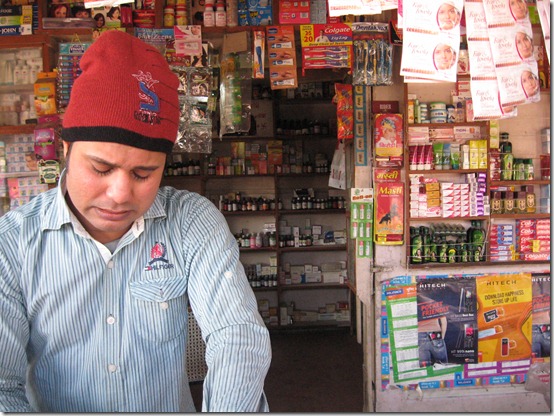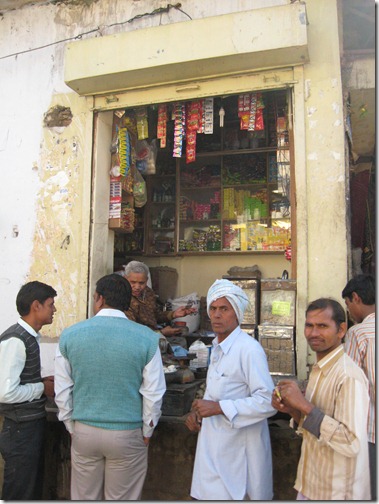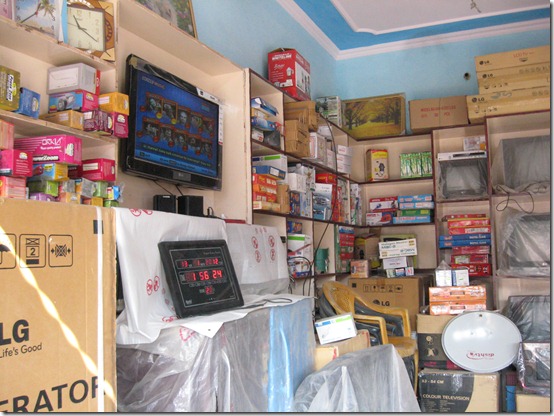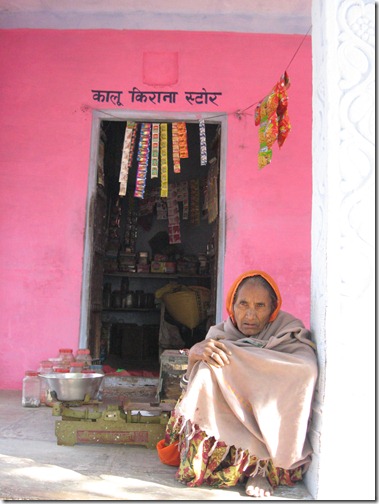I hired a car for the day and headed to the headquarters of United Villages, which is the main reason I came to Jaipur (no, it was not to look at pretty buildings). United Villages (UV) is a rural distributor of fast moving consumer goods. Its origins are at MIT, and it also has roots in Development Ventures (DV). Amir Hasson, MIT alum, spoke in class one day last fall. After he spoke, Jackie and I were like, “Whoa, they’re doing what we want to do.” Around Jaipur, UV has a network of stock transfer points and sales guys on motorbikes. Armed with smartphones that are equipped with UV’s web application, the sales guys visit between 25-40 stores a week to take orders. These are tiny stores, sometimes serving villages with 1,500 to 2,000 people. Deliveries are made weekly, with a minimum order of Rs 500 (about $10). The margins are small, but the volumes are getting larger. UV sells about 300 different types of products, from well known name brands to locally manufactured brands. They’re even begin to brand themselves by putting locally manufactured products under the UV brand.
UV wants to begin moving into consumer durables. For them, these durables mostly mean electronics. They’ve begun to include a solar inverter in their mobile catalog, along with a solar flashlight. Durables can be more difficult than consumer goods. Even though they’re higher value products, they require much more marketing (particularly if the product is new), and customers want after sales service. Thus, UV is mostly stock durables that come with a warranty and are produced by existing, trusted, branded companies. The company wants to begin moving into social impact products, too, but they need someone to take care of the on-the-ground marketing and education.
After my visit in the Jaipur offices, the CEO, Chintan Bakshi, arranged for my visit to the nearest field operations in Bassi. Bassi is about 40 km away from Jaipur, and I surprised my taxi driver with the idea of leaving the city. When we got to Bassi, I was met by the area sales manager. He and another UV staff member showed me various “counters” in Bassi. We visited the one cell phone counter, selected because he is the most entrepreneurial in the area. We visited multiple “general” counters that sell items like soap and shampoo, mostly by the sachet. Then, we visited one durables counter that sold products like televisions, refrigerators, satellite dishes, lights, heaters, etc. These are the types of stores I am most interested in, and it’s the type of store that UV is just begin to acquire as customers. Lastly, we drove a bit further and visited tiny, tiny stores that are also being serviced by UV.
I was impressed by UV’s reach. Serving small stores in tiny villages – where it is calm and peaceful, where there is no hustle and bustle – is pretty remarkable. It would be too easy to overlook these shops. After all, the larger village is just down the street, perhaps at 10 minute bike ride away. That is UV’s customer value proposition. Before, the shopkeeper would have to close up shop and travel to the larger village to buy his/her goods. The process could be an expensive hassle.
In the taxi, I had a phone call with Daniel Tomlinson from Frontier Markets (FM). FM also does what we want to do, except it uses the model demonstration centers with associated sales people. FM works around Jaipur, so there is already huge potential for collaboration between them and UV. Daniel basically said that Essmart should take a step back to truly understand rural markets before trying to do anything there. Since he had a good point, I took no offense to that. Also, he highlighted once again that villages across India are different. If Essmart wants to start in the south, we need to understand the culture. I suppose that another activity for us to do in Pollachi is to meet with some NGOs/MFIs/SHGs (nongovernmental organizations / microfinance institutions / self help groups) to answer some of these questions. Will talk with Prashanth about that.
Meeting or talking with other companies that are working in the space we want to inhabit is always helpful to Essmart. From their examples and experiences, we can more easily see which puzzle pieces are required to distribute essential technologies to rural customers. Definitely, key pieces are the marketing and the after sales service. These are areas that current companies are addressing. However, no one has really figured out the financing bit or how to cut down on the delivery costs. There is a lot of overhead in rural distribution, and cutting costs through innovation is key to making a business survive out there.




